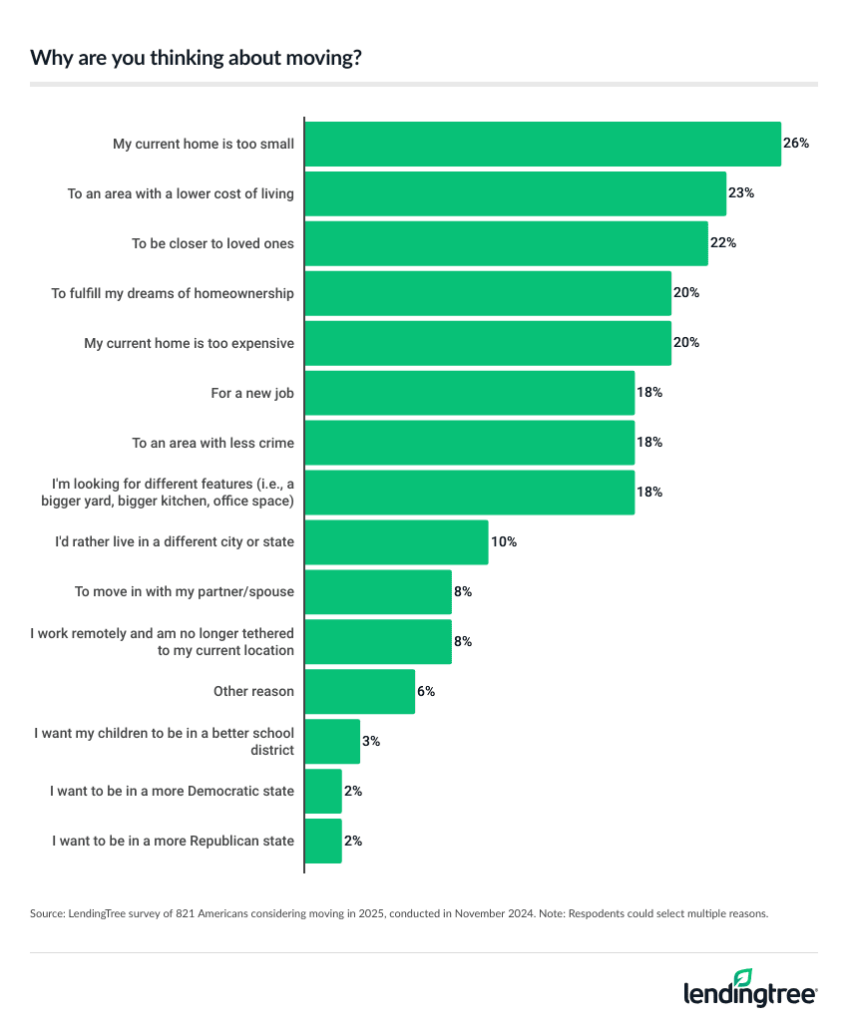There are many chances for both positive and bad development in 2025, despite the lack of confidence surrounding what this year may hold for the property market and the overall economy, according to Jacob Channel, Senior Economist at LendingTree.
As the new year begins, many Americans are considering whether they should stay in their existing homes or look for better opportunities elsewhere. An estimated 40% of Americans are thinking about moving in 2025, according to a recent report from LendingTree.
The results of a recent study showed who is most likely to be thinking about relocating and what motivates potential movers to consider moving to a new location. So, where are Americans looking to go? And why?
Highlights from the LendingTree study:
- Many Americans are considering moving this year. Indeed, according to 40% of Americans, they plan to move in 2025. Of Americans, roughly 21% may relocate inside their current city, 10% intend to relocate to a different city within the same state, some 8% are thinking about moving to a different state, and 2% are searching for a new country. 44% would rent if they moved, whilst 45% would buy.
- In 2025, politics will force people to relocate. Nearly half (48%) of those who might relocate say they are motivated to do so by the political environment. Some 43% of all Americans say they would be prepared to pay extra to live in a community that more closely aligns with their political beliefs and values. This is particularly true for millennials (53%) and Gen Zers (61%).
- Many potential movers were influenced by the outcome of the presidential election. According to 41% of respondents who are thinking about migrating, the outcome of the presidential election increases the likelihood. This is particularly true for men (47%), compared to only 32% for women. According to the election results, Gen Zers (48%) and millennials (47%) who are thinking about migrating are more likely to do so than Gen Xers (27%).
- The main motivations for relocating differ dramatically. Some 26% of people who are thinking about moving say their current house is too small, an estimated 23% want to relocate to an area where living expenses are lower, and 22% want to be near a loved one. Approximately 28% of those who wish to relocate say they intend to spend little less on housing than they do now, while 24% anticipate paying slightly more.
- In 2025, people’s housing decisions will be influenced by factors like safety and access to healthcare. An estimated 14% of women and 13% of men disagree, despite the fact that 87% of all respondents believe they have access to quality healthcare where they now live. Furthermore, compared to 8% of Republicans, some 11% of Democrats say they don’t feel safe in their current residence. Roughly 62% of people who feel unsafe say they will migrate as a result.

Where Are Americans Looking to Go?
The two demographics most likely to have moving on their minds are Gen Zers and millennials. Indeed, 51% of millennials (ages 28 to 43) and 66% of Gen Zers (ages 18 to 27) indicate they are considering moving. These are the only groups in which the majority of respondents are actively considering moving.
Despite the fact that millions of Americans relocate every year, the majority of them opt to remain in their current residence. This tendency appears set to continue this year, according to the results of LendingTree’s poll.
Overall, 60% of Americans say they intend to remain in their current location, while 40% indicate they are thinking about moving sometime in 2025. According to the data, 21% of respondents indicate they are thinking about relocating within their current city, 10% are thinking about relocating to a different city within their current state, 8% would move to a different state, and 2% would like to go abroad.While many Americans are considering relocating in 2025, the majority do not intend to move far.
Regardless of generation, an estimated 49% of parents with children under the age of 18 say they may relocate this year, making them comparatively more likely to consider a relocation than most other demographics.
On the other hand, some 82% of baby boomers between the ages of 60 and 78 say they intend to remain in their current location in 2025, making them the least likely to be thinking about moving. Additionally, Gen Xers aged 44 to 59 (66%) and parents with children aged 18 or older (72%) report that they are not moving more quickly than the general population.
Politics at the Forefront of Those Considering Relocating
As the new year makes way, many Americans are thinking about politics because of the outcome of the presidential election in November. Approximately half (48%) of prospective movers say they are motivated to relocate by the state of politics at the moment. Among Democrats, some 58% say politics is a motivator for moving, compared to 50% of Republicans and 36% of independents.
Further investigation reveals that 41% of prospective movers believe the outcome of the most recent presidential election increases their likelihood of moving. That percentage is 48% for Democrats, 42% for Republicans, and 32% for independents at the party level. Overall, 43% of Americans say they would pay more to live in a community that more closely aligns with their values and political beliefs.

Politics may not first seem like a compelling enough reason to take action. However, not all political disputes are insignificant, according to Channel. It’s to the free will of Americans to try to relocate if they feel threatened or that the political environment in certain locations prevents them from leading a productive and healthy life. It can be worth the extra money if you want to live in a community that respects and tolerates one’s preferred lifestyle and values.
Politics is a major consideration for many prospective movers, but it is not the sole factor. Conversely, there are many other things that are more likely to be on people’s minds. For instance, according to 26% of prospective movers, the most frequent reason for considering a move in 2025 is that their current residence is too tiny. Other than size, the two most common reasons are wanting to live near loved ones (22%), and wanting to live in a place with a cheaper cost of living (23%).
Other important factors include wanting to move out of an expensive property and achieving the goal of becoming a homeowner, which are both stated by 20% of potential movers.
Generations Weigh in On Relocation Preferences
Reasons for migrating tend to differ by demographic, even though some are more frequently mentioned.
For instance, some 31% of parents of children under the age of 18 believe their home is too tiny and they are thinking about moving. Compared to 22% of parents whose children are adults, that is a larger percentage. In a similar vein, Gen Zers are much more likely than previous generations to claim they are thinking of relocating in order to find employment. Compared to 10% of Gen Xers and 19% of millennials, a third of Gen Zers say they wish to relocate in order to find a new career.

The gap between consumers’ and economists’ perceptions of the overall economy appears to have grown over the past several years, according to commentary and data from Channel and LendingTree.
The U.S. economy is “performing well”, according to most economists. Wages are rising more quickly than prices, the GDP is expanding, unemployment is low, and inflation has essentially reverted to the Federal Reserve’s target level.
However, consumers frequently claim that the economy is not doing well. They often note that many people cannot afford housing, that interest rates on everything from mortgages to auto loans are still high, that debt delinquency rates are slowly rising, that personal savings rates are low, and that household debt is high.
Whether people plan to move this year or not, it’s crucial to understand that even the best-laid plans can go wrong. By the end of 2025, current moving-related objectives may have changed considerably.
To read the full report, including more data, charts, methodology, and tips for moving, click here.









